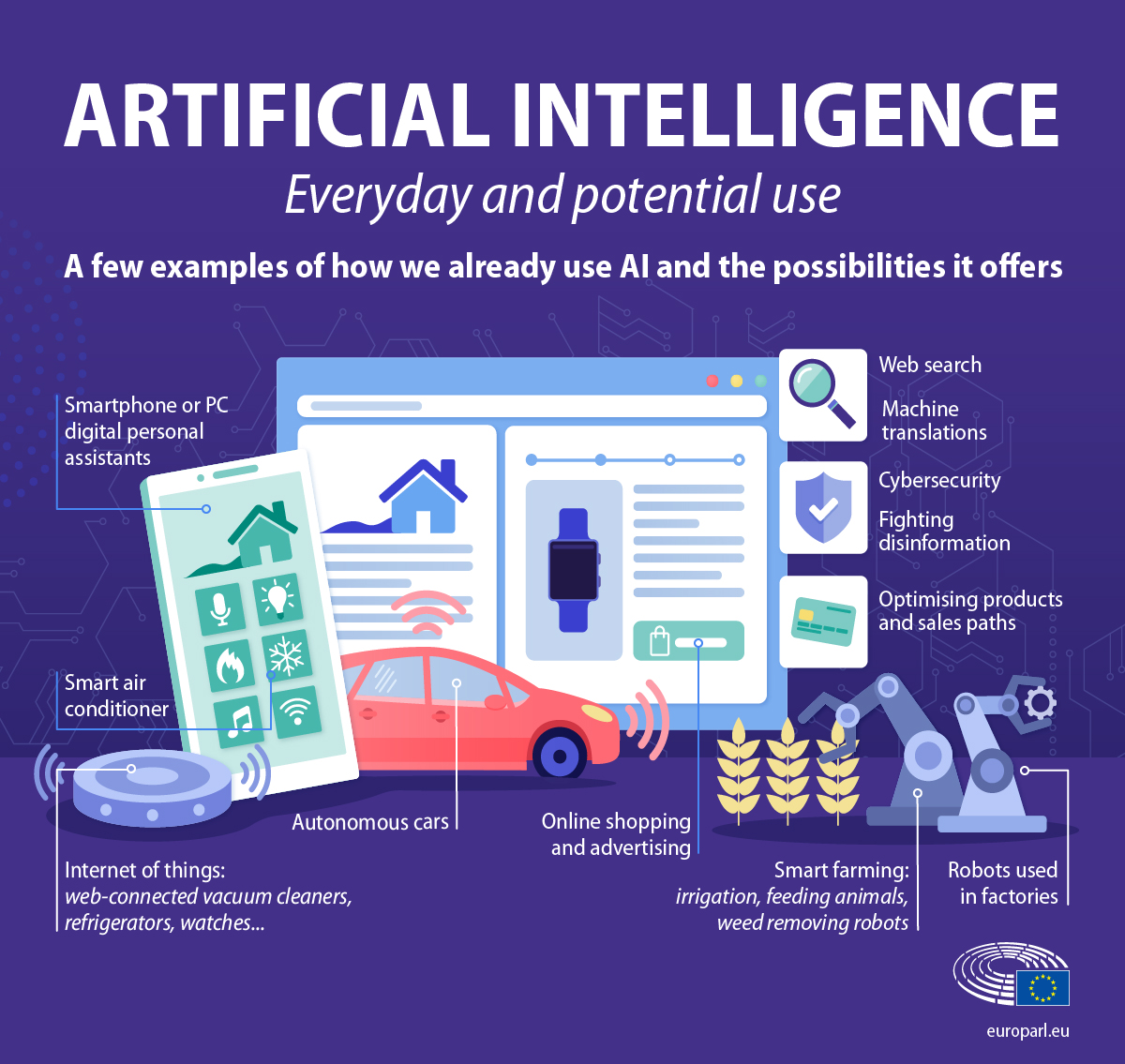Artificial intelligence is the future of technology and has revolutionized the way we interact with machines and devices. From self-driving cars to virtual assistants, AI has become an essential part of our daily lives. In this article, we will explore some of the most fascinating examples of artificial intelligence and how they are transforming various industries.
AI has the potential to change the world as we know it, and its development is accelerating at an unprecedented pace. With the ability to process vast amounts of data and learn from it, AI is making machines smarter and more capable than ever before. So, let’s dive into the world of AI and discover some of the most exciting examples of this groundbreaking technology.
Artificial intelligence has become an integral part of our lives. Some examples of artificial intelligence include virtual personal assistants like Siri and Alexa, image and speech recognition software, autonomous vehicles, and predictive analytics. These technologies use machine learning algorithms, natural language processing, and computer vision to perform tasks that traditionally required human intelligence.

Examples of Artificial Intelligence
Artificial intelligence (AI) has revolutionized the way we live and work. It has enhanced our productivity, automated various processes, and helped us make better decisions. AI has become an integral part of our lives, and we are not even aware of it. Here are some examples of AI that are changing the world.
1. Virtual Personal Assistants
Virtual personal assistants like Siri, Alexa, and Google Assistant are examples of AI that have become ubiquitous in our daily lives. These assistants use natural language processing (NLP) to understand our commands and perform tasks like setting reminders, making calls, and sending messages.
They use machine learning algorithms to learn our preferences and adapt to our behavior. This personalization makes them more useful and efficient. Virtual personal assistants have become essential for many people and have made our lives easier.
2. Image and Speech Recognition
Image and speech recognition are examples of AI that have transformed the way we interact with technology. Image recognition algorithms can identify objects, people, and even emotions in images and videos. This technology is used in self-driving cars, security cameras, and medical diagnosis.
Speech recognition algorithms can convert spoken language into text. This technology is used in virtual personal assistants, call centers, and language translation. Image and speech recognition have made technology more accessible and user-friendly.
3. Chatbots
Chatbots are examples of AI that have revolutionized customer service. These bots use NLP to understand customer queries and provide relevant answers. They can handle multiple queries simultaneously and provide 24/7 support.
Chatbots are used in various industries like healthcare, finance, and e-commerce. They have reduced response times, improved customer satisfaction, and reduced costs. Chatbots have become an essential part of customer service and have made it more efficient.
4. Predictive Analytics
Predictive analytics is an example of AI that has transformed business operations. This technology uses machine learning algorithms to analyze data and make predictions about future trends. It can be used to forecast sales, identify fraud, and optimize pricing.
Predictive analytics has helped businesses make better decisions, reduce costs, and increase profits. It has become an essential tool for businesses that want to stay competitive.
5. Autonomous Vehicles
Autonomous vehicles are examples of AI that are changing the transportation industry. These vehicles use AI to navigate roads, avoid obstacles, and make decisions. They use sensors, cameras, and machine learning algorithms to analyze their surroundings and make decisions.
Autonomous vehicles have the potential to reduce accidents, improve traffic flow, and reduce emissions. They are still in the early stages of development, but they have the potential to transform the way we travel.
6. Fraud Detection
Fraud detection is an example of AI that has transformed the finance industry. This technology uses machine learning algorithms to analyze data and identify fraudulent transactions. It can detect patterns and anomalies that humans might miss.
Fraud detection has helped banks and financial institutions save billions of dollars in losses. It has become an essential tool for preventing financial crimes.
7. Medical Diagnosis
Medical diagnosis is an example of AI that has transformed the healthcare industry. This technology uses machine learning algorithms to analyze medical data and make diagnoses. It can detect diseases and conditions that might be missed by human doctors.
Medical diagnosis has improved patient outcomes, reduced costs, and increased efficiency. It has become an essential tool for healthcare providers.
8. Personalized Marketing
Personalized marketing is an example of AI that has transformed the advertising industry. This technology uses machine learning algorithms to analyze customer data and provide personalized recommendations. It can predict customer behavior and preferences and tailor marketing messages accordingly.
Personalized marketing has improved customer engagement, increased sales, and reduced costs. It has become an essential tool for businesses that want to reach their target audience.
9. Language Translation
Language translation is an example of AI that has transformed communication. This technology uses machine learning algorithms to translate text and speech from one language to another. It can handle multiple languages and dialects and provide accurate translations.
Language translation has made communication more accessible and efficient. It has become an essential tool for businesses that want to reach a global audience.
10. Gaming
Gaming is an example of AI that has transformed entertainment. This technology uses machine learning algorithms to provide personalized gaming experiences. It can adapt to player behavior and provide challenges and rewards accordingly.
Gaming has become more immersive and engaging thanks to AI. It has become an essential part of the entertainment industry.
In conclusion, AI has become an essential part of our lives and is transforming the way we live and work. These examples of AI are just a few of the many ways that this technology is changing the world. As AI continues to evolve, we can expect even more exciting developments in the future.
Frequently Asked Questions
What are some real-life examples of artificial intelligence?
Artificial intelligence (AI) has become an integral part of our lives, from virtual assistants in our smartphones to facial recognition technology in our security systems. Some of the most prominent examples of AI in our daily lives include chatbots, recommendation systems, self-driving cars, and voice assistants like Siri and Alexa.
One of the most significant applications of AI is in healthcare, where it is used for predictive diagnostics, drug discovery, and personalized medicine. AI is also being used in finance and banking for fraud detection and risk management, and in agriculture for precision farming.
How is artificial intelligence used in business?
Artificial intelligence has revolutionized the way businesses operate by automating routine tasks, improving decision-making, and enhancing customer experiences. AI-powered chatbots are being used for customer service, while recommendation systems are helping businesses personalize their marketing strategies.
AI is also being used for predictive analytics, where it can analyze vast amounts of data to identify patterns and make accurate predictions. This is particularly useful in finance, where AI is used for fraud detection and risk management.
What is the difference between artificial intelligence and machine learning?
Artificial intelligence and machine learning are often used interchangeably, but they are not the same thing. AI refers to the ability of machines to perform tasks that typically require human intelligence, such as speech recognition and decision-making.
Machine learning, on the other hand, is a subset of AI that involves training machines to learn from data without being explicitly programmed. In other words, machine learning is a way of achieving AI.
How is artificial intelligence impacting the job market?
Artificial intelligence is transforming the job market by automating routine tasks and creating new job categories that require specialized skills. While some jobs may become obsolete, new jobs are also being created in areas like data analysis, machine learning, and AI development.
AI is also changing the nature of work by enabling remote work and increasing productivity. However, there are concerns that AI may lead to job displacement and exacerbate income inequality.
What are the ethical implications of artificial intelligence?
Artificial intelligence raises a host of ethical concerns, from privacy and security to bias and accountability. With AI becoming increasingly sophisticated, there are concerns that it could be used to perpetrate crimes or violate human rights.
There are also concerns about bias in AI algorithms, which can perpetuate discrimination and unfairness. As such, there is a growing need for ethical guidelines and regulations to ensure that AI is used in a responsible and ethical manner.
In conclusion, examples of artificial intelligence are numerous and constantly evolving. From Siri and Alexa to self-driving cars and medical diagnosis tools, AI has become an integral part of our daily lives. It has enabled us to automate tasks, improve efficiency, and make better decisions. However, as with any technology, there are concerns about its potential impact on employment, privacy, and safety.
Despite these concerns, the future of AI looks promising. With advances in machine learning, natural language processing, and robotics, we can expect to see even more sophisticated applications of AI in the near future. From autonomous drones and virtual assistants to personalized medicine and smart cities, the possibilities are endless.
As we continue to develop and integrate AI into our daily lives, it is important to remain mindful of its potential risks and benefits. By working together, we can ensure that AI serves the greater good and improves our lives in meaningful ways.

